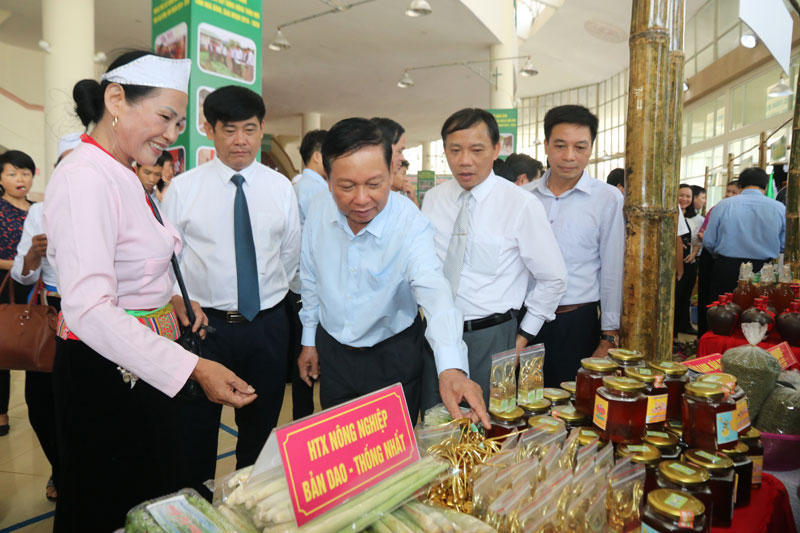
(HBO) - The northern mountainous province of Hoa Binh has organised a meeting to review the 10-year implementation of the national target programme on new-style rural area building during the 2010-2020 period.
Bui Van Tinh, member of the Party Central Committee, Secretary of the Party Committee of Hoa Binh province, and other provincial leaders visit the booth of the agricultural cooperative of Dao hamlet, Thong Nhat commune, Hoa Binh city.
After ten years of implementing the programme, rural areas in Hoa Binh have
been given a facelift across spheres, from politics to socio-economic
development and environmental protection. Locals’ living standards have been
improved significantly. Annual per capita income in rural areas is estimated at
32 million VND in 2019, and the rate of poor households is expected to drop to
about 14.28 percent. Hoa Binh province has also paid attention to
socio-economic infrastructure construction in these areas.
By September 2019, 82 out of 191 communes (42.9 percent) in the province had
been recognised as new-style rural areas. Each commune fulfilled about 15.01
criteria on average and there are no communes completing less than 10 criteria.
Prime Minister Nguyen Xuan Phuc recognised Hoa Binh city’s fulfillment of its new-style
rural area building duty in 2018. Meanwhile, Luong Son district is completing a
dossier for the PM’s recognition in 2019.
During the 2009-2019 period, the province mobilised 21.21 trillion VND for the
programme, of which 6.3 percent was sourced from the central budget. The
locality has built and upgraded more than 4,000 km of rural roads, nearly 800
km of canals, more than 500 school facilities, over 700 cultural works, nearly
80 rural markets and 80 communal medical centres, with investment totaling 52.7
trillion VND, of which 14 percent came from the State treasury.
On this occasion, the provincial Confederation of Labour presented 1,100 tonnes
of cement to Hoa Binh city and 10 districts to support their new-style rural
area building. /.
Hoa Binh province is undergoing a dynamic transformation amid Vietnam’s national digital transition. Building on Poliburo’s Resolution No. 57-NQ/TW on breakthroughs in science, technology, innovation, and national digital transformation, the province has rolled out a wide range of practical action plans. A standout initiative is the "Digital Literacy for All” movement, an effort to ensure that no one is left behind in the digital era.
Hoa Binh province is undergoing a dynamic transformation in the wake of the national digital transformation movement. Building on Resolution No. 57-NQ/TW of the Politburo on breakthroughs in science, technology, innovation, and national digital transformation, the province has implemented a wide range of practical action plans. A standout initiative is the "Digital Literacy for All” movement ambitious effort to ensure that no one is left behind in the digital age.
With a spirit of unity and proactive problem-solving, the Party Committee, the government and the people of Dong Lai Commune (Tan Lac District) have made great strides in implementing the resolutions of the 24th Party Congress of the commune for the 2020 - 2025 term. Focusing on leadership and practical actions, the commune has brought the Party’s resolutions into daily life, creating strong impacts and pushing the local development forward.
Amid the nationwide push for digital transformation, young people in Hoa Binh Province are stepping up as dynamic pioneers, applying technology to enhance Youth Union operations and expand the reach of youth-led initiatives. Through creativity and adaptability, Youth Union organizations at all levels have introduced a series of practical solutions, contributing to modern governance and community development.
In recent years, An Nghia commune, located in Lac Son district, has stepped up administrative reform, focusing on improving the quality and efficiency of its single-window service unit for receiving and processing administrative procedures. These improvements have helped create favourable conditions for local residents and organisations to handle administrative procedures, contributing to the commune’s broader socio-economic development.
The Prime Minister-approved master plan to develop the multi-use value of forests ecosystems through 2030, with a vision to 2050, aims to improve the management and sustainable use of forest resources, create jobs, increase incomes, and improve the living standards of ethnic minorities, people in mountainous and remote areas, forest workers and those living near forests.



